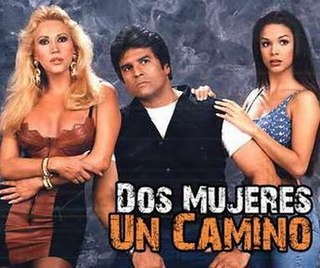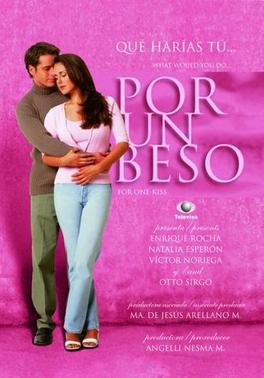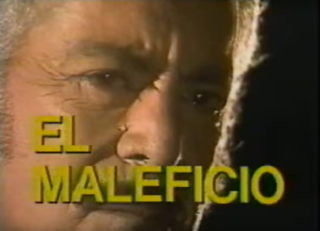Related Research Articles

Dos mujeres, un camino is a Mexican neo-noir telenovela produced by Emilio Larrosa for Televisa in 1993-1994. This production was exhibited in 47 countries, including Indonesia, had high viewer ratings, and has been described as one of Televisa's most successful telenovelas.
Alcanzar una estrella II is a Mexican telenovela produced by Luis de Llano Macedo for Televisa in 1991. It is the sequel to Alcanzar una estrella.

Alcanzar una estrella is a Mexican telenovela first broadcast on Canal de las Estrellas in 1990. Also broadcast in Latin America and on Univision in the United States, the telenovela tells the story of an introverted girl's infatuation with her teen idol. The leading roles were played by singers Mariana Garza and Eduardo Capetillo, ex-members of the Mexican pop band Timbiriche. The two also sang the theme songs, which were written by Ricardo Arjona. Arjona and other singers such as Patricia Manterola also made acting cameos. The story was produced by Luis de Llano, producer and manager of Timbiriche and Garibaldi, and written by actress Rita Macedo, de Llano's mother. Alcanzar una estrella turned out to be Macedo's last credit as an actress before she committed suicide in the mid-1990s.
La antorcha encendida is a Mexican telenovela produced by Ernesto Alonso and Carlos Sotomayor for Televisa in 1996. It was the last historical telenovela produced by Televisa. The plot tells the Independence of Mexico, with an emphasis on historical accuracy. It was written by Fausto Zeron Medina in collaboration with Liliana Abud. It premiered on Canal de las Estrellas on May 6, 1996 and ended on November 15, 1996.

Ni contigo... ni sin ti is a Spanish-language Mexican telenovela produced by Mapat L. de Zatarain for Televisa. It premiered on February 28, 2011 and ended on August 26, 2011.

Por un beso is a Mexican telenovela produced by Angelli Nesma Medina for Televisa in 2000. Based on La gata by Inés Rodena. It premiered on November 13, 2000 and ended on March 30, 2001.
By the Light of a Star is a 1941 Argentine musical drama film directed by Enrique Santos Discépolo and starring Hugo del Carril, Ana María Lynch and María Esther Gamas. It is a tango film, an extremely popular genre during the Golden Age of Argentine Cinema.

Graduados is a 2013 Colombian telenovela, a remake of the Argentine telenovela Graduados. It starred Luis Fernando Hoyos, Kathy Sáenz, Jorge Enrique Abello, Santiago Moure, Zharick León and Diana Ángel.

El maleficio is a Mexican telenovela directed by Raúl Araiza produced by Ernesto Alonso for Televisa in 1983. The telenovela was so successful in 1983 that a sequel was made under the title of El maleficio 2: Los enviados del infierno in 1986.
El ángel caído is a Mexican telenovela produced by Francisco Burillo for Televisa in 1985.
El engaño is a Mexican telenovela produced by Ernesto Alonso for Televisa in 1986. It is an original story by Caridad Bravo Adams, adapted by Fernanda Villeli and directed by Sergio Jiménez.
Tal como somos is a Mexican telenovela produced by Julissa and Juan Osorio for Televisa in 1987. It is an original story by Carlos Olmos and Enrique Serna and was directed by Antonio Acevedo.

Serafín, is a Mexican telenovela fused with 3D animation for any characters produced by José Alberto Castro for Televisa in 1999.
La fuerza del amor is a Mexican telenovela produced by Gonzalo Martínez Ortega for Televisa in 1990.

Yo compro esa mujer is a Mexican telenovela produced by Ernesto Alonso for Televisa in 1990. Based on the novel "The Count of Monte Cristo" by Alexandre Dumas, created by Olga Ruilópez and adapted by Liliana Abud.
Mi querida Isabel is a Mexican telenovela produced by Angelli Nesma Medina for Televisa. This telenovela is a remake of the 1975 Mexican telenovela Paloma, original story by Marissa Garrido. It premiered on Canal de las Estrellas on December 9, 1996 and ended on April 25, 1997.
Morir dos veces is a Mexican telenovela produced by José Rendón for Televisa. It premiered on Canal de las Estrellas on February 26, 1996 and ended on May 10, 1996.
Una luz en el camino is a Mexican children's telenovela produced by Mapat L. de Zatarain for Televisa in 1998. It is an adaptation of the 1991–1992 Argentinian children's telenovela El árbol azul.
References
- ↑ Lista negra Alma latina Retrieved February 8, 2015